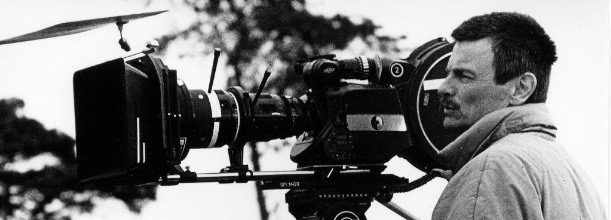Andrei Tarkovsky: Russia’s cinematic revolutionary

Working predominantly in the Soviet Union, Andrei Tarkovsky developed his innovative filmmaking style by exploring the use of time and space. He experimented with surrealism in both the visual and psychological sense sharing influences with contemporaries such as Ingmar Bergman. Bergman once said of Tarkovsky “for me, he is the greatest [director], the one who invented a new language, true to the nature of film, as it captures life as a reflection, life as a dream.” That’s right. Ingmar Bergman thinks he’s brilliant. And you don’t know anything about him, do you? This ends now.
Tarkovsky was a quintessential visionary of art cinema, fascinated by how metaphysical themes such as dreams and the subconscious could be projected through the film medium. His first film, Ivan’s Childhood (1962), is a World War II drama with an artistic twist; it blends stark realism with sequences of fantasy as Ivan, the Russian child spy, recalls vivid memories from his recent past. Mainly, he experiences haunting dreams about his deceased mother as he lives in hiding, crossing enemy lines at the eastern front. The cinematography is arguably way before its time; nearly every shot portrays an evocative, surrealist image, particularly with the long takes of the desolate Russian and German landscape. Accompanied by heightened sound effects and a fleeting dramatic score throughout, Ivan’s Childhood is an iconic yet bleak painting of Europe. These visions of darkness and beauty epitomise Tarkovsky’s style which is later demonstrated in his films from the 1970s and 1980s.
Like other maverick filmmakers of the era and many thereafter, Tarkovsky often rejected the linear and conventional narrative techniques. Intensely silent scenes and little or no dialogue between characters is a prominent feature of Tarkovsky’s filmmaking, which adds to his persona as a true originator of cinematic mystique. Particularly towards the end of his career with spiritual films like Nostalghia (1983) and The Sacrifice (1986), Tarkovsky investigated and challenged religion, immortality, and the raw complexity of human emotion.
Lost innocence is a theme revisited in Tarkovsky’s autobiographical fourth film aptly named The Mirror (1975). As a dying man reflects on his childhood during the Second World War, there are underlying political tones that sometimes come out in full force with real footage from communist protests, soldiers’ in battle and provocative, artistically framed images of burning buildings surrounded by rural pastures. With such psychological and emotional depth, a Tarkovsky film might often be too ambiguous to decipher. The Mirror switches from Technicolor to black and white for sequences set in both the past and the present. Along with the repeated use of slow motion and visual distortion, it comes to a point where the film is style over substance. However, what might be seen by some as a self-involved, pretentious kind of cinema could equally be critiqued as poetic intention. Quite literally sometimes, as Tarkovsky notoriously used classic and contemporary poems in his films to help express his cinematic vision.
Science fiction plays a significant role in Tarkovsky’s filmography with his adaptation of the Polish novel Solaris (1972) and the post-modern, dystopian film Stalker (1979). Both are widely acclaimed as influencing the popular genre and in the true spirit of Tarkovsky, they also include themes of existentialism, loneliness and detachment from reality. Solaris was remade in 2002 by Steven Soderbergh as some of you may know – it starred George Clooney (we knew that would jog your memory)? Yet the remake failed to resonate with audiences the same way Tarkovsky’s did thirty years earlier. The original, though sometimes vague in terms of its narrative, reveals ideas and images of space technology to create a fictional and visually intriguing world for the viewer. Tarkovsky experimented with character and set, notably gaining a lot of inspiration from Kubrick’s iconic 2001: A Space Odyssey (1968).
Andrei Tarkovsky was not the most prolific filmmaker; he only made seven feature films during his career and succumbed to cancer in 1986 at the age of 54. Due to the strict censorship in his home country, which affected the artistic intention of his cultural work such as the biopic Andrei Rublev (1966), Tarkovsky eventually took exile in Italy, France and Sweden to continue his career in a more liberal and accessible environment. Though his later work in particular might not connect with some modern day audiences, he remains a widely respected individual in both the academic and arts sectors for his contribution to contemporary art film as a movement. Along with his seven, unique films, The Andrei Tarkovsky Collection includes a rather ostentatious yet all the while informative documentary about Tarkovsky’s career, going into detail about the sentimental and cultural value of his films.










Recent Comments